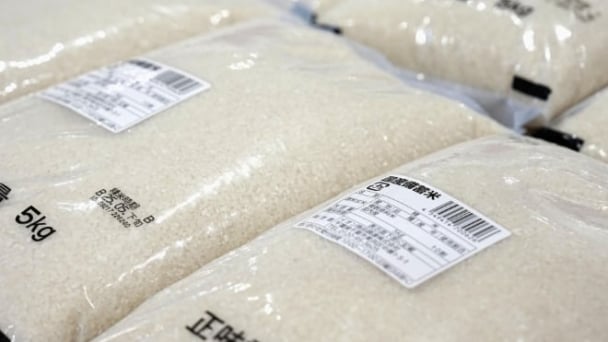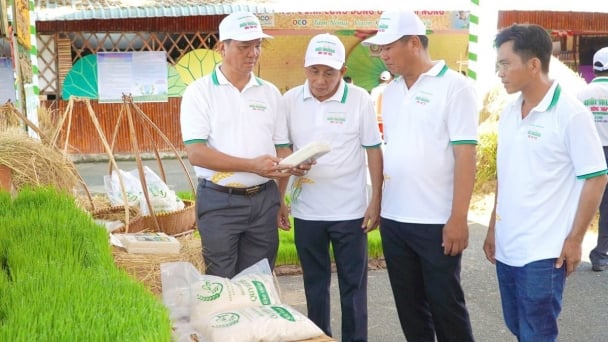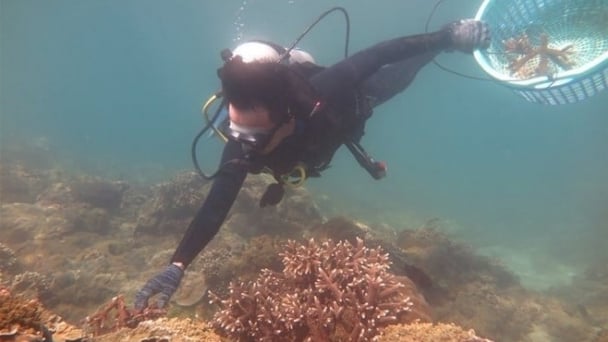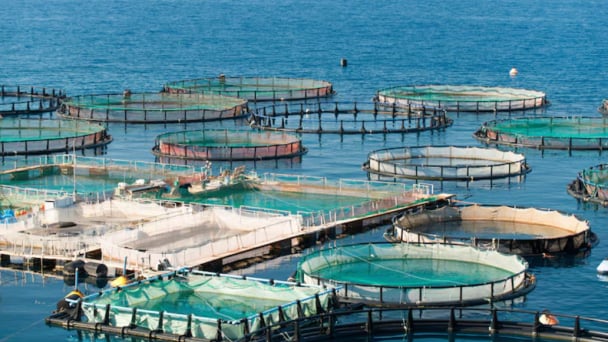June 11, 2025 | 21:35 GMT +7
June 11, 2025 | 21:35 GMT +7
Hotline: 0913.378.918
June 11, 2025 | 21:35 GMT +7
Hotline: 0913.378.918

Clam farming in Ben Tre has been formed for a long time and is currently creating jobs for tens of thousands of cooperative members in the province. Photo: Kim Anh.
Taking advantage of the sea area with many alluvial grounds, many farmers in the coastal areas of the Mekong Delta, such as Ben Tre, Kien Giang, Tien Giang, and Tra Vinh, have zoned the sea surface to raise clams.
Particularly in Ben Tre province, clam farming has been formed and developed for a long time. Looking back at the development history of the clam industry, Mr. Nguyen Van Buoi, Deputy Director of the Provincial Department of Agriculture and Rural Development, said that in the past, people produced on a small scale, mainly in a spontaneous way.
Later, the province's agriculture sector mobilized people to link and form cooperatives to make the production, exploitation, and management of clam grounds more sustainable. However, the stages of harvesting and trading clams are still through collection agents, so prices are often unstable.
Recognizing this problem, the Ben Tre Department of Agriculture and Rural Development, together with the governments of districts and communes, is developing clam farming and implementing a plan to build a clam value chain suitable to production conditions and market needs.
Cooperatives are trained and instructed on how to build stable and sustainable clam farming areas. At the same time, cooperative members are oriented to produce according to MSC standards, creating clean clams to supply to export businesses.
In 2009, the entire clam area of Ben Tre province received MSC certification from the Marine Stewardship Council. This is the first fishing industry in Vietnam and Southeast Asia to achieve this certification.
5 years later (2015-2020), this locality continued to receive MSC certification for the second time and was re-certified for the third time in 2024.

MSC certification for Ben Tre clams is a great motivation for people to raise awareness and responsibility in exploiting and managing natural resources. Photo: Kim Anh.
In order for the clams produced to ensure food safety and MSC certification standards, cooperative members must strictly follow the established procedures.
Mr. Nguyen Van Quyet, Director of Thanh Loi Seafood Cooperative in Thanh Hai commune, Thanh Phu district, said that since achieving MSC certification, more businesses have come to buy clams, so cooperative members have had stable output.
Realizing the value that this certification brings, people are more aware and responsible in the production process that must ensure quality, especially clean sand in clams.
This is proven through the fact that the Cooperative directly sold clams into the factory to businesses instead of through agents as before.
After being harvested, clams will be put into a natural sand purification system, with a very high target of 99.9%. Mr. Quyet said that the factory only allows 0.1% defective products. If clams still contain sand from 0.2% or more, the purchasing price will be deducted from VND 1,500/kg. With this strict production process, the awareness of cooperative members is increasingly raised, thanks to which, over the years, it has been very favorable to export Ben Tre clams to demanding markets.
Besides, to exploit the domestic market, members of Thanh Loi Seafood Cooperative linked to establish a clean clam farm. At the same time, register for OCOP product certification to increase value and income for people.

The natural sand purification system at Thanh Loi Seafood Cooperative creates clean clams to supply to export businesses. Photo: Kim Anh.
According to the Ben Tre Department of Agriculture and Rural Development, the potential area for developing clam farming in the province is over 7,000 hectares, of which 4,200 are currently being exploited. The province has established seven cooperatives to develop the clam exploitation profession, creating jobs for over 20,000 cooperative members.
Every year, the amount of clams harvested is over 8,000 tons, bringing in revenue of over VND 200 billion, thereby making an important contribution to the economic development of coastal localities in the province.
In the coming time, to continue to maintain and develop the clam industry, especially to support cooperatives to produce, manage, and exploit effectively and sustainably, the Ben Tre Department of Agriculture and Rural Development will orient and accompany cooperative members to build a value chain including management agencies, cooperatives, businesses, and scientists.
At the same time, build the model "Soak clams clean" with technical support from factories. Clams, after being harvested from clam grounds, will be cleaned before being sent to the factory, so the selling price will be better.
Translated by Thu Huyen
/2025/06/11/3507-1-161904_583.jpg)
(VAN) Seagrass beds and coral reefs serve as 'cradles' that nurture life in the ocean depths, creating rich aquatic resources in Vietnamese waters.
![Turning wind and rain into action: [1] Forecasting for farmers](https://t.ex-cdn.com/nongnghiepmoitruong.vn/608w/files/news/2025/06/11/e5a48259d6a262fc3bb3-nongnghiep-111919.jpg)
(VAN) Weather is no longer just a matter of fate. Forecasts have now become an essential companion for farmers in every crop season.
/2025/06/10/2501-3-082025_983.jpg)
(VAN) Mr. Le Hoang Minh, Head of Vinamilk's Net Zero project, recently shared insights on the integration of production, energy, and technology in Vinamilk’s green transition journey.

(VAN) Over half of large-scale rice producers feel that store prices for rice are 'too high', indicating that many of them share concerns with consumers about the elevated cost of the staple food in Japan.

(VAN) Dong Thap has launched a meeting in response to the Action Month for the Environment under the theme 'Live Green - Join Hands for a Green Economy' at Tram Chim National Park.

(VAN) The ocean has the capacity to absorb millions of tons of carbon, provided that mangrove forests, coral reefs, and biodiversity are protected.

(VAN) Technology is redrawing the map of Vietnamese aquaculture: more modern, greener, and more sustainable.